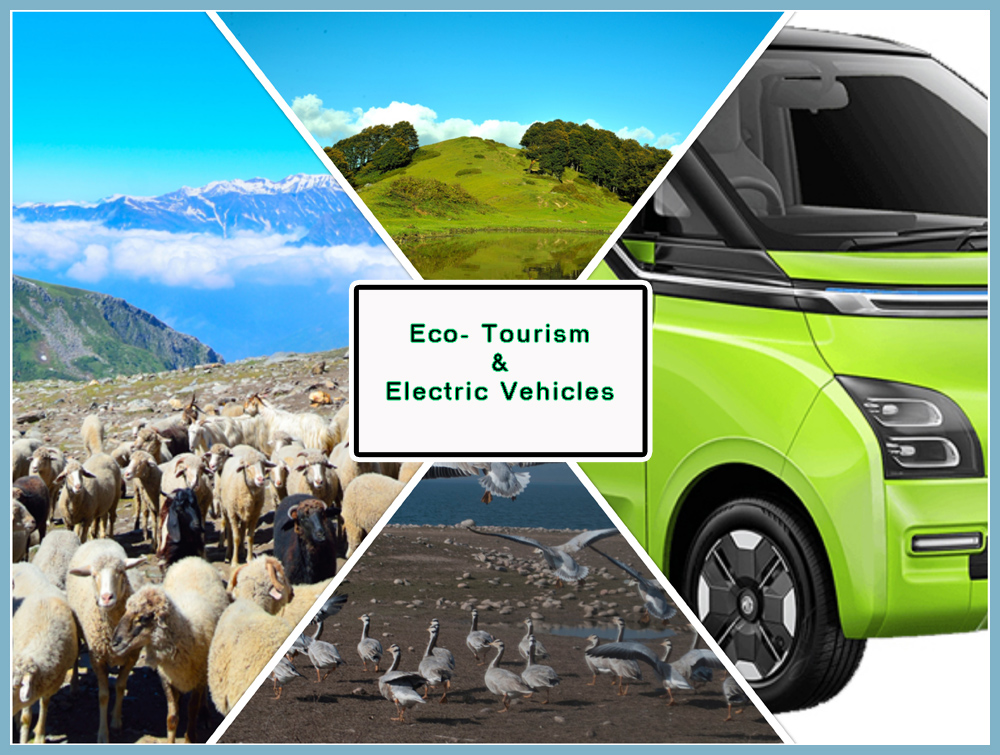
Eco-tourism, a sustainable form of travel that prioritizes the preservation of natural environments and the well-being of local communities, has gained significant momentum in recent years. This trend aligns seamlessly with the emergence and adoption of electric vehicles (EVs), as they offer an environmentally conscious solution to the transportation needs of eco-tourists. In this comprehensive exploration, we will delve deeply into the dynamic relationship between eco-tourism and electric vehicles, shedding light on the multitude of ways in which these two facets of sustainable living intersect and mutually reinforce each other.
I. The Rise of Eco-Tourism
Eco-tourism, often referred to as sustainable tourism, is a form of travel that focuses on the responsible exploration of natural environments while minimizing negative impacts on ecosystems and local communities. It emerged as a response to concerns about the environmental and social consequences of mass tourism. This travel trend emphasizes several core principles:
Conservation of Natural Resources: Eco-tourism prioritizes the protection and preservation of natural resources and ecosystems. Travelers are encouraged to visit and appreciate pristine environments while leaving them unspoiled.
Support for Local Communities: It aims to benefit local communities by involving them in the tourism industry, providing employment opportunities and supporting local businesses. This approach ensures that the economic benefits of tourism are distributed equitably.
Education and Awareness: Eco-tourism seeks to educate travelers about the importance of biodiversity, environmental conservation and cultural heritage. It fosters a deeper understanding and appreciation of the destinations visited.
II. The Electric Vehicle Revolution
Electric vehicles, or EVs, have gained prominence as a sustainable alternative to traditional gasoline or diesel vehicles. They are powered by electricity stored in batteries and produce zero tailpipe emissions. Key features of EVs include:
Zero Emissions: Unlike internal combustion engine vehicles, EVs produce no direct emissions, making them environmentally friendly and contributing to improve air quality.
Recycling OF EV Batteries: Balancing Environmental Benefits and Challenges
Energy Efficiency: EVs are highly energy-efficient, with a significantly higher energy conversion rate compared to gasoline or diesel engines. This means they can travel longer distances on the same amount of energy.
Reduced Noise Pollution: Electric vehicles operate almost silently, reducing noise pollution in urban and natural environments. This characteristic aligns well with the peace and tranquility sought by eco-tourists.
Advancements in Battery Technology: Over the years, advancements in battery technology have increased the range and charging efficiency of EVs, making them more practical for long-distance travel.
III. The Synergy Between Eco-Tourism and Electric Vehicles
Now, let’s explore how eco-tourism and electric vehicles come together in a harmonious partnership that benefits both travelers and the planet.
Reduced Carbon Footprint: At the core of the eco-tourism ethos is the goal of minimizing one’s environmental impact. Electric vehicles are inherently eco-friendly, producing no tailpipe emissions. When eco-tourists choose EVs for their journeys, they significantly reduce their carbon footprint compared to conventional vehicles. This alignment with eco-tourism principles underscores the importance of sustainable transportation choices.
Silent Travel: One of the joys of eco-tourism is the opportunity to immerse oneself in the natural soundscape. Electric vehicles, with their silent operation, allow travelers to fully experience the tranquility of nature. This silent travel experience enhances the overall quality of eco-tourism adventures.
Enhanced Accessibility: Many eco-tourism destinations are located in remote or off-grid areas where access to fuel stations can be limited. Electric vehicles, equipped with increasingly efficient batteries and expanding charging infrastructure, provide greater accessibility to such locations. This enables tourists to explore and appreciate the beauty of untouched landscapes without harming them.
Cost Savings: While the initial purchase price of EVs may be higher than that of traditional vehicles, eco-tourists can save on operational costs. Charging an EV is often cheaper than refueling with gasoline or diesel, especially as more regions offer incentives and reduced electricity rates for EV owners. This makes electric vehicles a cost-effective choice for travelers, particularly when covering long distances during eco-adventures.
Educational Opportunities: Eco-tourism is not just about sightseeing; it’s about learning and raising awareness about the environment. Electric vehicles can serve as educational tools by showcasing sustainable transportation solutions to tourists. Some eco-tour operators even offer EV-specific tours, explaining the benefits of electric mobility and its role in preserving natural habitats. This educational aspect aligns with the core values of eco-tourism, which emphasize the importance of environmental education.
Supporting Local Economies: Many eco-tourism destinations are in rural or economically disadvantaged areas. The installation of electric vehicle charging infrastructure can create opportunities for local businesses. Charging stations, powered by renewable energy sources like solar or wind, not only facilitate EV travel but also contribute to the sustainable development of eco-tourism destinations. This synergy supports the local economy while promoting eco-friendly travel.
Government Initiatives: Many governments worldwide are actively promoting both eco-tourism and electric vehicle adoption through incentives and policies. These initiatives include tax credits for EV purchases, subsidies for charging infrastructure development and grants for eco-tourism businesses. The dual support from governments encourages travelers to choose EVs for their eco-adventures, further strengthening the connection between these two green initiatives.
Unlocking offers : Exploring Government Tax Deductions and Incentives for Electric Vehicles in India
Reduced Impact on Fragile Ecosystems: Eco-tourism often involves exploring delicate and pristine natural ecosystems, such as rainforests, wetlands and coral reefs. Electric vehicles, with their zero emissions and minimal noise pollution, have a lower impact on these fragile environments compared to traditional vehicles. This preservation of ecosystems is a fundamental goal of eco-tourism and EVs align perfectly with this objective.
Promotion of Sustainable Tourism Practices: The adoption of electric vehicles in eco-tourism can serve as a model for sustainable tourism practices. By demonstrating the feasibility and benefits of EVs, eco-tourism businesses can inspire other sectors of the tourism industry to embrace eco-friendly transportation options, contributing to broader sustainability efforts.
Mitigation of Climate Change: Eco-tourism, when coupled with electric vehicle use, contributes to the mitigation of climate change. Reduced carbon emissions from transportation align with global efforts to combat climate change, making eco-tourism destinations more resilient to the impacts of a changing climate.
IV. Case Studies and Examples
To illustrate the practical implementation of the eco-tourism and electric vehicle partnership, let’s examine a few real-world case studies and examples:
Galápagos Islands, Ecuador: The Galápagos Islands are renowned for their unique biodiversity and fragile ecosystems. To protect these ecosystems, the local government has encouraged eco-tour operators to adopt electric vehicles for island tours. Electric buses and boats now offer visitors an eco-friendly way to explore this iconic destination, reducing the environmental impact on land and sea. Read a report here
Norway: Norway, a leader in electric vehicle adoption, has integrated EVs into its eco-tourism offerings. Travelers can rent electric campervans for journeys through Norway’s stunning fjords and national parks, minimizing their carbon footprint while enjoying the country’s natural beauty.
Costa Rica: Costa Rica, known for its commitment to environmental conservation, has embraced electric transportation in its eco-tourism sector. Eco-lodges and tour companies offer EV rentals and charging stations are strategically placed in popular eco-tourism regions, making it convenient for travelers to explore the country sustainably.
National Parks in the United States: Many U.S. national parks have started introducing electric shuttle buses and encouraging visitors to use electric vehicles. This approach reduces air pollution and noise within these pristine natural environments while aligning with the conservation goals of the parks.
V. The Future of Eco-Tourism and Electric Vehicles
The partnership between eco-tourism and electric vehicles is poised for continued growth and innovation. Several developments and trends indicate a promising future for this green collaboration:
Advancements in EV Technology: As electric vehicle technology continues to evolve, we can expect longer ranges, faster charging times and more energy-efficient vehicles. These advancements will enhance the appeal of EVs for eco-tourists, making them even more practical for exploring remote and environmentally sensitive areas.
Expansion of Charging Infrastructure: The global expansion of EV charging infrastructure is crucial for the widespread adoption of electric vehicles in eco-tourism. Governments, businesses and environmental organizations are investing in charging networks to support sustainable travel in remote regions.
Eco-Friendly Lodging and Accommodations: Eco-tourism extends beyond transportation. Many eco-friendly lodges and accommodations are integrating electric vehicle charging stations, creating a seamless experience for travelers seeking both sustainable transportation and lodging.
Innovative Travel Experiences: The marriage of eco-tourism and electric vehicles is giving rise to innovative travel experiences. These include guided EV tours, self-driving EV adventures and multi-day eco-tours that combine sustainable transportation with immersive nature experiences.
Sustainability Certification: Certification programs, such as the Global Sustainable Tourism Council’s criteria for eco-tourism, are incorporating sustainability criteria related to transportation choices. This encourages tour operators to consider electric vehicles as part of their commitment to eco-friendly travel.
In conclusion, eco-tourism and electric vehicles are indeed a match made in green heaven. As travelers increasingly seek meaningful and sustainable experiences in natural environments, electric vehicles offer an eco-friendly mode of transportation that aligns perfectly with the principles of eco-tourism. This synergy not only reduces the environmental impact of travel but also enhances the overall experience for tourists while supporting the conservation of our planet’s natural wonders.
The eco-tourism and electric vehicle partnership represents a powerful and evolving force for positive change in the travel industry. It demonstrates how responsible travel choices can contribute to environmental conservation, support local communities and inspire a deeper connection to nature. As we move toward a more sustainable future, the collaboration between eco-tourism and electric vehicles will play an increasingly vital role in promoting eco-conscious exploration and preserving the beauty of our planet for generations to come.
